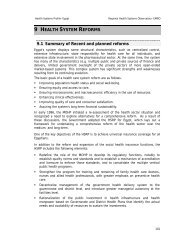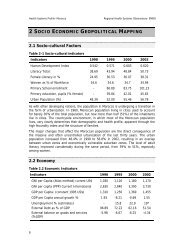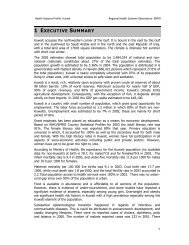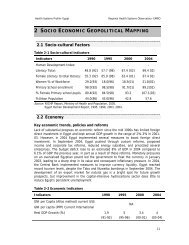The role of contractual arrangements in improving health sector ...
The role of contractual arrangements in improving health sector ...
The role of contractual arrangements in improving health sector ...
You also want an ePaper? Increase the reach of your titles
YUMPU automatically turns print PDFs into web optimized ePapers that Google loves.
Lebanon<br />
could be a first step towards end<strong>in</strong>g the fragmentation <strong>of</strong> <strong>health</strong> f<strong>in</strong>anc<strong>in</strong>g. This step will entail<br />
some challenge <strong>in</strong> terms <strong>of</strong> consolidation <strong>of</strong> adm<strong>in</strong>istrative structures <strong>of</strong> different agencies, but<br />
would be well worth the effort.<br />
Identified problems with current <strong>contractual</strong> <strong>arrangements</strong>, whether they concern the<br />
M<strong>in</strong>istry <strong>of</strong> Public Health or other public f<strong>in</strong>anc<strong>in</strong>g agencies, mostly reflect two key factors.<br />
• Lack <strong>of</strong> political support. A wide range <strong>of</strong> reforms are urgently needed <strong>in</strong> the <strong>health</strong> <strong>sector</strong>.<br />
<strong>The</strong>se <strong>in</strong>clude, most urgently, end<strong>in</strong>g the current fragmentation <strong>of</strong> <strong>health</strong> care f<strong>in</strong>anc<strong>in</strong>g. Use<br />
<strong>of</strong> <strong>contractual</strong> <strong>arrangements</strong> as a tool for reform requires political support as contracted<br />
parties, whether hospitals or physicians or other providers, have large powers and can exert<br />
them very effectively over the public <strong>sector</strong>. This is compounded by their dom<strong>in</strong>ance <strong>of</strong><br />
<strong>health</strong> service delivery. <strong>The</strong> difficult economic conditions <strong>of</strong> over-supplied provider groups<br />
<strong>in</strong> the midst <strong>of</strong> ongo<strong>in</strong>g economic difficulties <strong>in</strong> Lebanon further complicates the situation.<br />
Nevertheless, visionary public <strong>health</strong> policies and stewardship and more pressures from<br />
beneficiaries can br<strong>in</strong>g on pr<strong>of</strong>ound changes.<br />
• Lack <strong>of</strong> adequate capacities. It is commonly <strong>in</strong>dicated that current capacities <strong>in</strong> the different<br />
public <strong>health</strong> agencies are not adequate to oversee and monitor a different scope <strong>of</strong><br />
contract<strong>in</strong>g <strong>arrangements</strong> that emphasize quality <strong>of</strong> care and which are outcome based. For<br />
example, most agencies do not have the needed number <strong>of</strong> highly qualified supervisory<br />
physicians. A different and new set-up is needed for <strong>contractual</strong> <strong>arrangements</strong> with different<br />
focus. This <strong>in</strong>cludes a <strong>health</strong> <strong>in</strong>formatics system, <strong>in</strong>terl<strong>in</strong>ked f<strong>in</strong>anc<strong>in</strong>g agencies and<br />
providers and enhanced transfers <strong>of</strong> data and payment.<br />
CONTRACTUAL ARRANGEMENTS: A SCORECARD<br />
Table 5 summarizes strengths and weaknesses <strong>of</strong> contract<strong>in</strong>g <strong>arrangements</strong> accord<strong>in</strong>g to<br />
f<strong>in</strong>anc<strong>in</strong>g agency. It might be also useful here to provide a general overview <strong>of</strong> what contract<strong>in</strong>g<br />
<strong>arrangements</strong> can and cannot do. Contractual <strong>arrangements</strong> provide important contributions to<br />
the performance <strong>of</strong> the <strong>health</strong> care system <strong>in</strong> Lebanon. <strong>The</strong>se <strong>arrangements</strong>:<br />
Provide the legal and organizational framework for public–private <strong>in</strong>teractions to provide <strong>health</strong><br />
care and <strong>health</strong>-related services to large segments <strong>of</strong> the Lebanese population (both the<br />
<strong>in</strong>sured and un<strong>in</strong>sured).<br />
Cover un<strong>in</strong>sured portions <strong>of</strong> the Lebanese population, thereby contribut<strong>in</strong>g to improv<strong>in</strong>g equity.<br />
This is especially important with regards to coverage <strong>of</strong> hospitalization and acute care<br />
services. Coverage <strong>of</strong> primary care services is gradually improv<strong>in</strong>g.<br />
Support selected nongovernmental organizations which provide basic social services beyond <strong>health</strong><br />
care.<br />
Improve the capacity <strong>of</strong> the Government <strong>of</strong> Lebanon to monitor performance <strong>of</strong> contracted <strong>health</strong><br />
care <strong>in</strong>stitutions.<br />
Can lead to upgrad<strong>in</strong>g standards and performance <strong>of</strong> contracted parties.<br />
171
















